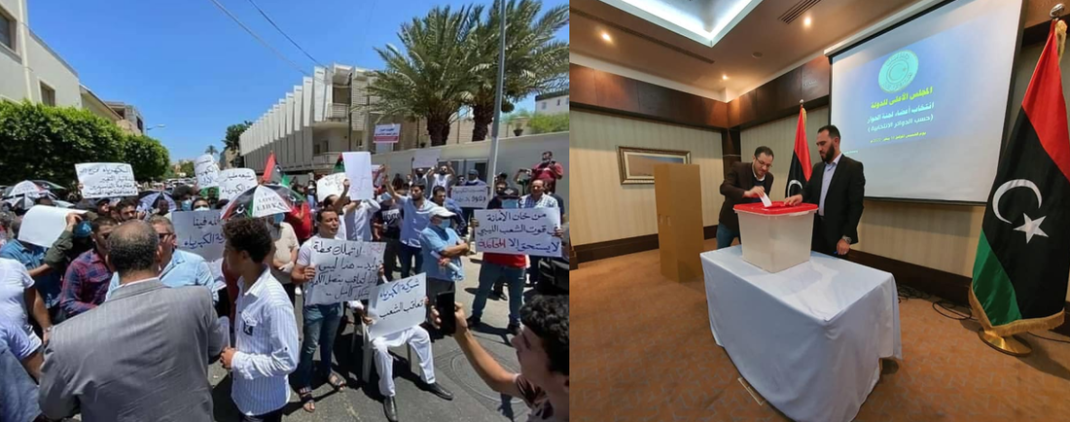By Sasha Toperich & Michael Barbaro


The United States Constitution is unique in the way it has endured over two centuries of a dynamic nation. It is a gold standard to which other countries would do well to exemplify when building the foundations of their own democratic societies.
Such is the case with Libya. Recent developments in Libya’s fledgling democracy, the drafting of its constitution, and the holding of elections may seem trivial when compared to the efficacy and longevity of American democratic institutions. However, after years of conflict caused by internal divisions and fueled by external interference, there is reason for optimism.
The path has not been easy
In 2014, two years after being elected as the first post-Gaddafi president, Mohamed Magariaf paved the way to public election of 60 committee members charged with drafting a new Libyan constitution as a precondition for a negotiated Skhirat agreement, signed by all parties to the political dialogue, in Morocco in December 2015. It took more than three years before a new draft was passed with 43 of 60 votes.
The draft was not without its opponents. In eastern Libya, the Tobruk-based House of Representatives (HoR) held a session in which nine representatives from the East and five from the South of Libya voted against the draft with the claim that minority rights were unrecognized, and the distribution of Libya’s wealth was unfair. These appeals were dismissed by the Libyan Supreme Court.
Amazigh, Tebu, and Tuareg tribes, receiving only six committee appointments in the voting quota, boycotted the election itself. The Amazigh tribe also demanded their language to be included as an official language in a new constitution. The HoR refused to convene a call for the national referendum on the draft; however, it was ultimately approved by the constitutional committee after much debate.
Outside parties also sought to apply influence. As part of its failed effort to reassert itself as a key EU mediator in Libya, France pushed for the elections to be held on Dec. 10, 2018, as agreed at an ad-hoc organized meeting in Paris in May of that year.
The meeting was held between Macron and four key political figures from Libya: Fayez al-Sarraj Libyan Chairman of the Presidential Council and the Prime Minister; Khalid al-Mishri, president of the High State Council; Aguila Saleh, speaker of the House of Representatives; and renegade warlord Khalifa Haftar. In November 2018, to ease anxiety over the election date, then-UN special envoy for Libya Ghassan Salamé suggested elections could be held early in 2019, rebuking France’s overeager initiative.
On the eve of the Palermo conference on Libya, held in November of 2018, Salamé criticized the HoR for refusing to approve the election law despite the fact that surveys indicated 80 percent of Libyans wanted elections and an end to the political stalemate between rival administrations in the East and West.
In December 2018 — in an effort to build national momentum — the Chairman of Libya’s elections commission Emad al-Sayeh announced a referendum on a new constitution before the end of February 2019.
To secure the progress achieved, Salamé worked hard to organize a Libyan National Conference planned for April of 2019. The conference was set to launch national elections, putting Libya on a path toward lasting peace and reconciliation.
But after all that effort, progress toward democracy was seemingly derailed.
None of these positive developments were favorable in the eyes of Khalifa Haftar, who saw such progress as an obstacle in his quest for absolute control. He launched a military offensive. In doing so, Haftar further destabilized the already fragile relationships among Libyan tribes and people.
His attack on Tripoli came only days before the UNSMIL’s anticipated Libyan National Conference in Ghadames. Later, after launching a war on Libya’s West, Haftar dismissed freely elected municipal councils and appointed military officers loyal to his cause, thus creating a police state in the East.
Nevertheless, democracy remains possible
A glimmer of hope for a future democratic Libya can be found in the actions of the High Council of State (HCS), a national advisory body established under the Skhirat agreement, with the mandate to advise the Presidential Council and the House of Representatives with binding opinions.
Since its formation, the HCS has held four elections — from its first president Abdulrahman Sewehli, who presided over the Council from February 2016 to April 2018, to Khalid al-Mishri, who won his third term on Sunday.
At the latest elections, eleven candidates competed to assume the HSC presidency and deputy roles. The success of HCS elections is a small example of how democracy-building can be achieved in Libya on a national scale.
The road to a stable, peaceful and democratic Libya remains uncertain with many obstacles. However, the recent actions of the High Council of State provide a positive indicator of what is possible.
***
Sasha Toperich is senior executive vice president of the Transatlantic Leadership Network. From 2013 to 2018, he was a senior fellow and director of the Mediterranean Basin, Middle East and Gulf initiative at the Center for Transatlantic Relations at the Paul H. Nitze School of Advanced International Studies at Johns Hopkins University in Washington.
Michael D. Barbero is the Vice President of the Transatlantic Leadership Network and a retired Lieutenant General of the United States Army.
___________





